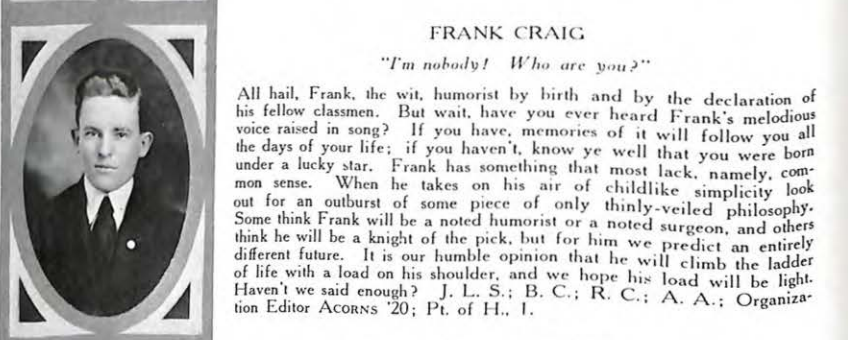A Hobo Hero
This week's work of literature heralds an occasional feature in which we publish stories that, by virtue of their age, find themselves in the public domain.
This week's work of literature heralds an occasional feature in which we publish stories that, by virtue of their age, find themselves in the public domain. As far as we know, it has been 101 years since A Hobo Hero has been published, appearing in the Acorns of Roanoke High School yearbook of 1920. We are indebted to a loyal reader who scoured the archives of the Virginia Room at the Roanoke Public Libraries and brought this story to our attention. See how strangely this short, sweet piece of juvenilia, penned by Frank Craig, can whisk the reader back in time, while, perhaps, speaking to themes of our own day.
It had been a sultry afternoon, but now the sun was setting, and a distant cloud gave promise of relief. All day Blinkey had followed the steel rails and his half-shod feet, coming so intimately in contact with the ties and clinkers, had put him in an irritable mood. This was not Blinkey's natural state of mind. He was ordinarily of an easy-going nature, believing that the world owed him a living, but putting forth very little effort to collect the debt.
But now his attitude toward the world was decidedly changed. He saw no reason why luck should cast luxury on many, while he, led ever on by wanderlust, was just a rolling stone. As he turned a bend in the tracks, he came upon a party of people laughing and talking under the trees. Here was a good example of what he had just been thinking. He quickly retraced his steps and came up in the bushes by the very side of the frolickers. He could almost have reached out and touched them, so close was he; his eyes bulged at the sight of what he saw. They were a select party of picnickers from the city. Their limousine stood by the roadside not far away. Upon a white cloth spread upon the grass was such a feast as poor Blinkey had never seen in his wildest dreams. The men were enjoying themselves to the limit, having already imbibed a little too freely of the bottles in the pails of ice. One of the men was opening a bottle as Blinkey watched. In the act of drawing a corkscrew from his pocket, he drew also, unknown to himself, a green bill. Blinkey saw it, and his first impulse was to make a dash for it, and then bolt into the bushes. As he was considering, the rain began to fall. The ladies ran to the car, and the gentlemen, gathering up most of the things, joined them, and soon they speeded away.
Blinkey made one bound to the spot where the money lay. Short as the interval was, it seemed a century — was it a one, would it be a five, or could it possibly be a ten? He didn't know they went higher than that, or he would have conjectured further. When he saw what it really was, he staggered. A FIFTY! He grabbed it, put it in his watch pocket, and fairly flew lest they should discover the loss and return. He took to the tracks again and soon slowed down to his easy jog. He couldn't think while running and there was so much to think about! He would go on now to Spodunk. But first he would get a new suit, and spats, and Oxfords that had three buttons on the sides, and a plug hat, and one of these swell stickpins that look just like a diamond.
It was dark now, and the rain had settled into a steady drizzle. But he was so engrossed in his thoughts that he was hardly aware of it. He could imagine how the folks would look at him and that Simmons gal would sure fall for him this time.
He was a gentleman now, and felt very proud. It was, indeed, with a very condescending air that he stepped from the tracks to give a passing freight the right-of-way. He returned to the tracks when the freight had passed, but had not gone far when he stumbled upon an obstacle across the tracks. He took in the situation immediately. The heavy freight had torn loose a rail, making a gap in the track. He would tell some one about it at the next station.
Far away he heard the low whistle of a coming passenger train. He must do something himself, at once. But what could he do? He ran along the tracks to where he saw an old switch light standing, evidently long out of service. He grabbed the lantern off and examined it. There was no wick, no oil. He fumbled in his pocket for a match. He found one, and only one. The whistle blew again. much nearer this time. He hurried forward trying to find something that the rain had not made unburnable. Not a dry thing or piece of paper anywhere that he could risk his lone match on. He searched his pockets for a bit of paper but found nothing. The engine was speeding down the track. He must act quickly or in a moment the engine would reach that breach and there * * * His hand flew quickly to his watch pocket and drew forth a crisp oblong of paper. He, in a moment more, had lit it and thrust it into the red globe of the lantern. Would the engineer see the dim, flickering red light? Yes, he heard the grinding of the wheels as the emergency brakes went on. The conductor jumped from the car and came to where a moment before a streak of red had shown. and there found the torn-up track. Soon he was joined by a throng of passengers inquiring for their benefactor, but the conductor said he had seen no one but a slouching tramp crossing the fields toward a distant haystack.
FRANK CRAIG, '20.


